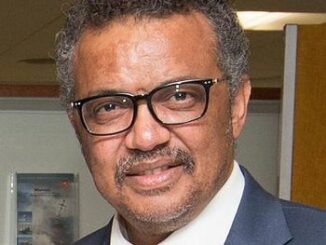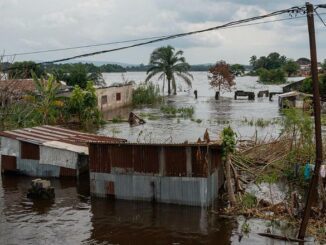
GENEVA, Switzerland, April 24, 2020 (ENS) – The World Health Organization, heads of government, health officials, philanthropists, and the private sector partnered Friday in a collaboration to speed the development and production of vaccines and treatments to eradicate the coronavirus pandemic and to make certain that they are distributed quickly and equally around the world.
The video conference held to launch Access to COVID-19 Tools Accelerator was attended by leaders from Costa Rica, Finland, France, Germany, Great Britain, Italy, Malaysia, Norway, Rwanda, Saudi Arabia, Spain, South Africa, the African Union, and the European Union.

Dr. Tedros Adhanom Ghebreyesus, director-general of the World Health Organization, told participants, “Since January, WHO has been working with thousands of researchers all over the world to accelerate and track vaccine development – from developing animal models to clinical trial designs, and everything in between.”
“We’ve also developed diagnostics that are being used all over the world, and we’re coordinating a global trial on the safety and efficacy of four therapeutics against COVID-19. The world needs these tools, and it needs them fast,” said Tedros.
“Past experience has taught us that even when tools are available, they have not been available equally to all,” he said. “We cannot allow that to happen.”
French President Emmanuel Macron, German Chancellor Angela Merkel, and South African President Cyril Ramaphosa were among those on the video conference. Representatives from China and the United States and were not present at the meeting.
“We hope we can reconcile the initiative with China and the U.S.,” French President Emmanuel Macron told the group. “There should not be any divisions between countries. We need to join forces.”
European Commission President Ursula Von der Leyen said that to raise funds in support of this endeavor, the European Union and its partners will organize a worldwide pledging marathon beginning on May 4.
Countries and organizations everywhere are invited to pledge to help reach the target of €7.5 billion (US$8.1 billion) in initial funding. The funds collected will be channeled into three initiatives: diagnostics, treatments, and vaccines.
The countdown to the start of the pledging marathon begins today, the first day of 2020 World Immunization Week organized by the United Nations. The theme this year is #VaccinesWork for All.
President von der Leyen said, “We need to bring the world, its leaders and people together against coronavirus. In just 10 days, we will launch a global pledging effort. A real marathon. Because beating coronavirus requires a global response and sustained actions on many fronts. We need to develop a vaccine, to produce it and deploy it to every corner of the world. And we need to make it available at affordable prices.”

Norway’s Prime Minister Erna Solberg will be one of the co-chairs of the pledging effort. “We welcome the European Commission’s initiative to hold a major international conference to mobilize support for the development of vaccines, diagnostics, and treatments for COVID-19. Given our longstanding engagement in the area of global health, it is only natural for Norway to do its part when we are asked to co-chair a conference of this kind,” Solberg said.
Already, US$2 billion has been pledged to the ACT Accelerator, said Mohammed Al-Jadaan, Saudi Arabia’s minister of finance, leaving a gap of about $6 billion.
Prime Minister of Malaysia Muhyiddin Yassin said, “COVID-19 has impacted all lives and the global economy in ways never before experienced in common memory. The only way we can destroy this virus is through solidarity and cooperation.”
Prime Minister of Spain Pedro Sánchez agrees. He told his fellow leaders, “As long as people are affected anywhere in the world none of us is safe. Solidarity is the only way forward. When a vaccine is found, it must be accessible to everyone in every nation of the world. No private company, no govt acting alone can do this. Together we can find the tools to address the virus faster, better.”
Chad’s Moussa Faki, who heads the African Union Commission, said, “Innovation based on science will allow us to overcome COVID-19.”
Sir Andrew Witty and Dr. Ngozi Okonjo-Iweala will act as Special Envoys for the ACT Accelerator, Dr. Tedros announced.
Sir Andrew said, “Please count on me for open-minded collaboration to bring this to an end as quickly as possible.” The British business executive, who was CEO of the pharmaceutical company GlaxoSmithKline between 2008 and 2017, now is CEO of Optum, a healthcare business.
In April 2020, Sir Andrew began a leave of absence from Optum to assist the World Health Organization in developing a vaccination for COVID-19.
Dr. Okonjo-Iweala is a Nigerian-born economist and international development expert who sits on the Boards of Standard Chartered Bank, Twitter, Global Alliance for Vaccines and Immunization, and the African Risk Capacity. She will now help to mobilize international economic support for the Access to COVID-19 Tools Accelerator.
American philanthropists Bill and Melinda Gates donated US$150 million from their foundation to the fight against COVID-19 in February, and on April 15 the Bill & Melinda Gates Foundation announced an expansion of its grant funding to include an additional $150 million plus a commitment to leverage the resources of the foundation’s Strategic Investment Fund, which could be used to buy essential medical supplies and help life sciences companies secure financing to produce COVID-19 products.

“It is increasingly clear that the world’s response to this pandemic will not be effective unless it is also equitable,” said Gates Foundation co-chair Melinda Gates. “We have a responsibility to meet this global crisis with global solidarity. In addition to contributing to the development of diagnostics, therapeutics, and vaccines, these funds will support efforts against COVID-19 in low-and-middle-income countries, where local leaders and healthcare workers are doing heroic work to protect vulnerable communities and slow the spread of the disease.”
First of Many Vaccines in Development Proves Effective
For the first time, one of the many COVID-19 vaccines being developed in labs around the world has protected animals, monkeys called rhesus macaques, from infection by the novel coronavirus, scientists report. The vaccine is based on a chemically inactivated version of the virus.
Researchers from Sinovac Biotech, a private company with headquarters in Beijing, gave two different doses of this COVID-19 vaccine to eight rhesus macaques. Three weeks later, the scientists introduced SARS-CoV-2, the virus that causes COVID-19, into the monkeys’ lungs through tubes. The vaccine provided “partial or complete protection in macaques against SARS-CoV-2 challenge,” the researchers reported April 19 in a pre-print journal “bioRxiv.”
No monkeys developed COVID-19 infection and the vaccine produced no apparent side effects in the monkeys. Human trials began on April 16.
After Online Attacks, WHO Beefs Up Cybersecurity
As this global effort gears up, the World Health Organization wants everyone to know that since the start of the COVID-19 pandemic, WHO has seen “a dramatic increase” in the number of cyberattacks directed at its staff, and email scams targeting the public at large.
This week alone, some 450 active WHO email addresses and passwords were leaked online along with thousands belonging to others working on the novel coronavirus response.
The leaked credentials did not put WHO systems at risk because the data was not recent. However, the attack did impact an older extranet system, used by the current and retired staff as well as partners.
WHO is now migrating the affected systems to a more secure authentication system.
Scammers impersonating WHO in emails have also increasingly targeted the general public in order to channel donations to a fictitious fund and not the authentic COVID-19 Solidary Response Fund. The number of cyberattacks is now more than five times the number directed at WHO in the same period last year.
“Ensuring the security of health information for Member States and the privacy of users interacting with us a priority for WHO at all times, but also particularly during the COVID-19 pandemic. We are grateful for the alerts we receive from Member States and the private sector. We are all in this fight together,” said Bernardo Mariano, WHO’s Chief Information Officer.
WHO is working with the private sector to establish more robust internal systems and to strengthen security measures and is educating staff on cybersecurity risks.
WHO asks the public to remain vigilant against fraudulent emails and recommends the use of reliable sources to obtain factual information about COVID-19 and other health issues.
Find out more about the Access to COVID-19 Tools Accelerator and how to get involved on the European Union’s Coronavirus Global Response website: europa.eu/global-response
Copyright Environment News Service (ENS) 2020. All rights reserved.
© 2020, Environment News Service. All rights reserved. Content may be quoted only with proper attribution and a direct link to the original article. Full reproduction is prohibited.



